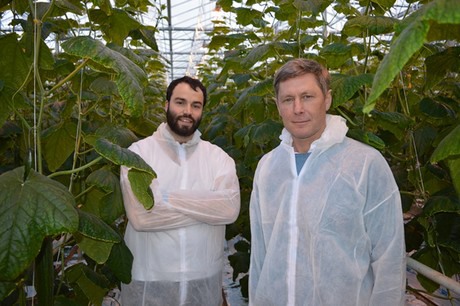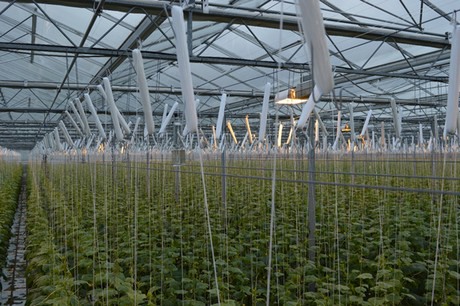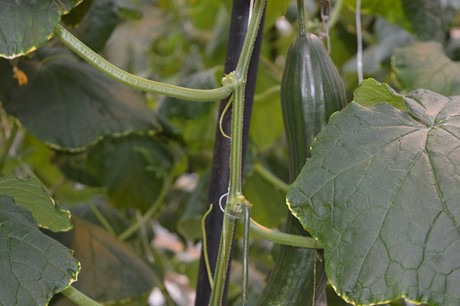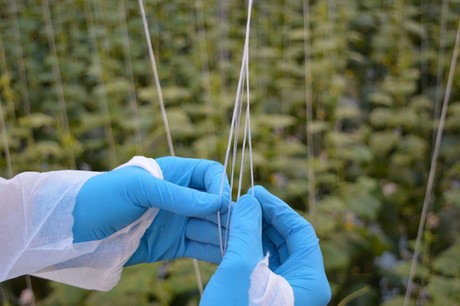Since the start of this season, Gardener’s Pride has added a cucumber crop to their tomato cultivation. Since the beginning of January, 3.7 hectares of cucumbers grow on high-wire in the Dutch town of Klazienaveen. Unlike most twines being used in cucumber crops, these are not made of plastic, but made out of a biological and compostable material.

Marco van Overbeek (Gardener’s Pride) and Joris van Calcar (Lankhorst Yarns) in the greenhouse where Gardener’s Pride has started growing cucumbers this year as requested by Albert Heijn.
Sustainable novelties
Sustainability, that's what Marco wants and what he's working for. At the 30 hectare Gardener’s Pride farm, a 2 hectare greenhouse is even dedicated to test all sorts of sustainable novelties and solutions. These include organic substrate and limiting the use of chemicals used in the crop.
Also the use of biological and compostable horticultural twine fits in this vision. Ever since 2016 the Elite Horti Twine has been used in a 5 hectare tomato crop. Also the newly installed cucumber cultivation (3.7 hectares) is equipped with it.

Length of the twine
In the Gardener’s Pride cucumber greenhouse, the Elite Bio Twine is being used on hooks of 26 centimeters each. In total, 30 meters is used for the entire cultivation. This includes 2 crop rotations.
The heavier the crop, the thicker the twine needs to be. At Gardener’s Pride, the twine has a length of 1000 meters per kilo. Joris van Calcar with Lankhorst Yarns explains: “At its core, bio twine is not as strong as the more accessible plastic horticultural yarn. This you can compensate with the length."
The team with Lankhorst Yarns is currently working on creating a thinner twine. In the meantime, it is important to know what the maximum weight of the crops can be. "Many growers don’t know this exactly. That is why it is wise to choose a slightly thicker type of twine for the first year of using it and then decrease the thickness the next year and so on and so on. Just to make sure.”
Organic waste rate
From a sustainability point of view, the choice to go for Elite Bio Twine is a logical next step, but still not a step all growers are willing to take. And even at Gardener’s Pride another 22 hectares hasn't been equipped with the compostable twines. An important reason for this is the fact that waste processors are being ‘difficult’ when it comes to the rates for crop waste.
“The insecurity regarding the waste rates currently pump the breaks on sustainability", Marco says. He explains how the waste rates for waste containing plastics are way higher than the rates for organic waste. “This year I get the organic rate from a waste processor in the area, but this can all be different next year. That uncertainty is what causes some growers to not choose for this, slightly more expensive, type of twine. Only when the organic rate is guaranteed will Elite Bio Twine become financially interesting for the growers as well."
Joris van Calcar of Lankhorst Yarns explains to us that: “Although scientific research conducted by Wageningen University & Research (WUR) shows that 99% of the Elite Bio Twine turns to microfibers after 6 to 8 weeks of composting, many waste processors still calculate the same high rates for it as they do for crop waste that contains plastic."
"They do this even though additional research conducted by WUR shows that the remaining microfiber waste is not harmful to the soil and the organisms that are living in it. The significantly lower rates used for organic waste should also be used for the crop waste consisting of Elite Bio Twine, which is made from PLA (a vegetable sugar found in the starch from corn plants).”

The rates for plastic waste are increasing more and more, even in the Netherlands. Joris expects that it is due to this that the need for using Elite Bio Twine will increase.
Convincing with the composting results
To the chagrin of growers like Marco and others, the Dutch waste processors are not that easily convinced. As a matter of fact, they seem to come up with stricter demands and rules every year.
Even though it frustrates him on one hand, there's also some understanding by both Joris and Marco. “Many suppliers have some sort of ‘Biotwine’ in their product range now, but not all of these twines are completely compostable. Because of this waste, processors are becoming even more reluctant to change the rates. It is up to us to win back their trust.”
This will need to be paired with some well thought out composting results. Joris: “At the moment, 10% of all the compost still ends up getting burned, because it is too polluted with plastic due to the use of accessible plastic horticultural yarn among other things.”

Reducing plastic use is part of the total sustainable concept
Plastic is being banned more and more, yet when discussing the reducing of plastic, the focus mainly lies with the packaging and not with the cultivation. Joris: “The consumer doesn’t see this reduction of plastic in cultivation, but does benefit from it. That is why it is important to let this be known to the consumer as well.”
A task for the retailer, but also for growers, Marco assures us. “This is why we try to show some things about cultivation on social media on a regular basis. The fact that we use Elite Bio Twine will also show on there. Though it might be ‘just a piece of twine’, when you can show how much plastic has been saved at the end of the year it is definitely worth it. Even for the retailers who sell your products.”
For more information: 
Lankhorst Yarns
www.lankhorstyarns.com
info@lankhorstyarns.com
Gardener’s Pride
www.overbeektomaten.nl
info@overbeektomaten.nl
